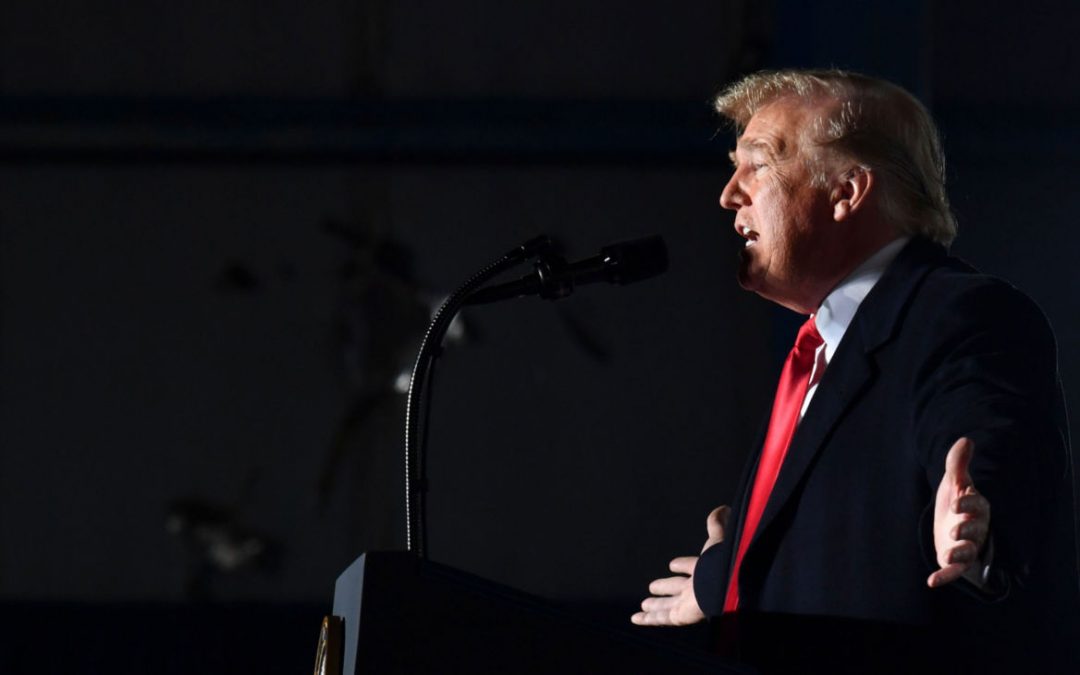The core of President Trump’s base is showing signs of cracking after four years of steadfast support, and just as he ramps up his bid for a second term.
Ever since Trump descended the escalator at his namesake tower in New York City, white voters without a college education have formed the foundation of his political success.
He won two-thirds of those voters in 2016, and they were among the few demographic groups that maintained positive views of his job performance.
But new surveys show that support is dropping, and that an increasing number of Trump’s biggest fans now disapprove of the job he is doing in office.
Four surveys released this week show Trump’s approval rating slipping substantially, thanks in large part to a drop in support among non-college educated white voters.
A Pew Research Center survey released today shows Trump’s job approval rating at 37 percent, near the lowest point that survey has ever found.
Among non-college educated white respondents, 50 percent approve of Trump’s job performance, while 48 percent disapprove.
That’s a net 15-point swing from a Pew poll conducted a year ago; in that survey, 54 percent of white respondents without a college degree approved of Trump’s job performance, while 37 percent disapproved.
“This obviously is a key group for the president,” said Carroll Doherty, the Pew Research Center’s director of political research.
A survey conducted by SSRS for CNN found Trump’s job approval rating among white people without a college degree at 45 percent, down 9 points since early December.
A non-partisan Quinnipiac survey out this week showed Trump’s job rating among those voters slip from a net 19-point positive margin to a net 10-point positive margin.
And a survey conducted by the Marist Institute for Public Opinion for NPR and PBS NewsHour shows Trump’s approval rating slipping — and his disapproval rating rising — among Republicans, white evangelicals, suburban men and those without a college degree.
“It’s the first time that there’s been significant erosion in the base,” said Lee Miringoff, who runs the Marist poll. “An erosion of the base is the last thing he needs. His whole strategy has been base-focused.”
A stunning 57 percent of respondents said they would definitely vote against Trump in the 2020 elections, according to the Marist poll, while 30 percent said they would vote to reelect him.
Among non-college educated whites, 42 percent said they would vote for Trump again, while 44 percent said they would vote for someone new.
A majority of non-college educated white women, 53 percent, said they would definitely vote for someone else.
Trump supporters dismissed the recent polls as a temporary wane in the dynamic cycle of public opinion.
“Polls ebb and flow, but reality is that the American people are better off now than they were two years ago because of President Trump’s policies. GDP and wages are up, unemployment has hit record lows, consumer confidence is soaring, and industries across the country – manufacturing, construction and health care – continue to experience steady growth. These results speak for themselves,” said Blair Ellis, a spokesperson at the Republican National Committee.
Worryingly for the White House, Trump’s decline has come in spite of growing optimism about the economy and their own economic prospects.
Instead, the falling support seems fueled by a string of self-inflicted wounds, from a partial government shutdown that has become the longest in American history to a decision to pull troops out of Syria that met stiff resistance from congressional Republicans and the constant trickle of news about special counsel Robert Mueller’s investigation.
Polls conducted in recent weeks have showed more voters blame Trump for the shutdown than those who blame Democrats. In a December meeting with top Democratic leaders, Trump declared he would be “proud to shut down the government for border security.”
Trump’s overall approval rating is at or near its lowest ebb in many of the most recent surveys.
His disapproval rating stands at 55 percent in the most recent RealClear Politics average of recent polls, its lowest point since March. His approval rating has never been higher than 46 percent in that average.
